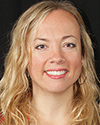CEW+ Advocacy Symposium: Redefining Leadership
Michigan League
Registration is now closed
Join CEW+ for its annual fall symposium focused on redefining leadership. The 2019 Symposium includes a diverse group of scholars, community practitioners and international activists who embody leadership in varied ways as they advocate for change. Shannon Cohen and Stephanie Land will kick off the Symposium during the Mullin Welch Lecture where they will discuss how nontraditional leadership strategies can enhance advocacy work with a focus on self-care, resilience, and systemic change.
This working symposium is free and open to all activists, advocates, and allies from all U-M campuses (students, staff, faculty) as well as the local community.
Please note that the official symposium is from 8:30am-5:00pm with an optional networking reception to follow.
The CEW+ Advocacy Symposium is organized in partnership with Barger Leadership Institute and Poverty Solutions at the University of Michigan with funding from CEW+’s Frances & Sydney Lewis Visiting Leaders Fund and the CEW+ Mullin Welch Fund.
Mullin Welch Lecture Keynote Speakers
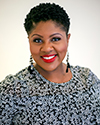 Shannon Cohen, MPA, founder and principal of Shannon Cohen, Inc., is an award-winning industry leader and sought-after strategist, innovator, and inspirational leader. She is an A W.K. Kellogg Foundation Community Leadership Network Fellowship alumnus and Encore Innovation Fellow alumnus of the Grand Rapids Community Foundation. Shannon is also an adjunct faculty member at Grand Valley State University where she is passionate about empowering emerging and existing leaders to be transformative in the communities they serve. Shannon authored Tough Skin, Soft Heart, a handbook designed to equip overextended leaders with strategies to navigate the emotional, mental, and physical strain that often accompanies a life committed to advocacy work. She is the co-founder of Sisters Who Lead, a movement birthed from a research study facilitated with Patricia Sosa VerDuin entitled ‘Invisible Walls, Ceilings, and Floors: Championing the Voices and Inclusion of Female Leaders of Color in West Michigan’ and is designed to advance the wellness and career mobility of women of color to executive leadership.
Shannon Cohen, MPA, founder and principal of Shannon Cohen, Inc., is an award-winning industry leader and sought-after strategist, innovator, and inspirational leader. She is an A W.K. Kellogg Foundation Community Leadership Network Fellowship alumnus and Encore Innovation Fellow alumnus of the Grand Rapids Community Foundation. Shannon is also an adjunct faculty member at Grand Valley State University where she is passionate about empowering emerging and existing leaders to be transformative in the communities they serve. Shannon authored Tough Skin, Soft Heart, a handbook designed to equip overextended leaders with strategies to navigate the emotional, mental, and physical strain that often accompanies a life committed to advocacy work. She is the co-founder of Sisters Who Lead, a movement birthed from a research study facilitated with Patricia Sosa VerDuin entitled ‘Invisible Walls, Ceilings, and Floors: Championing the Voices and Inclusion of Female Leaders of Color in West Michigan’ and is designed to advance the wellness and career mobility of women of color to executive leadership.
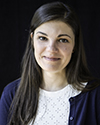 Stephanie Land grew up in a middle-class household but a car accident at age 16 led to her having PTSD. As a young adult, she became a single mother struggling financially to care for her daughter and going to college while trying to escape an abusive relationship. She cleaned houses and went on welfare to cover necessary expenses which later informed her writing on the issues of poverty and public policy. After years on public assistance programs, she finally completed her BA in English & Creative Writing in 2014 and officially ended her dependence on food stamps in 2016. She is currently a fellow for the Center for Community Change and the Economic Hardship Program. Land’s debut book, Maid: Hard Work, Low Pay, and a Mother’s Will to Survive was released in early 2019, debuting at #3 on The New York Times Best Seller list. In this account, Stephanie shares her frustrations navigating government assistance programs that are more hindrance than a help to the working poor.
Stephanie Land grew up in a middle-class household but a car accident at age 16 led to her having PTSD. As a young adult, she became a single mother struggling financially to care for her daughter and going to college while trying to escape an abusive relationship. She cleaned houses and went on welfare to cover necessary expenses which later informed her writing on the issues of poverty and public policy. After years on public assistance programs, she finally completed her BA in English & Creative Writing in 2014 and officially ended her dependence on food stamps in 2016. She is currently a fellow for the Center for Community Change and the Economic Hardship Program. Land’s debut book, Maid: Hard Work, Low Pay, and a Mother’s Will to Survive was released in early 2019, debuting at #3 on The New York Times Best Seller list. In this account, Stephanie shares her frustrations navigating government assistance programs that are more hindrance than a help to the working poor.
Conference Schedule
Rackham Graduate School Amphitheater
Michigan League Concourse & Ballroom
Michigan League Ballroom
Michigan League Ballroom
Michigan League Ballroom
Michigan League Ballroom
Michigan League
Michigan League Ballroom
Michigan League Concourse
Michigan League
Michigan League
Michigan League
Michigan League Ballroom
Speakers
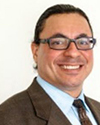 Samer M. Ali, PhD is an Associate Professor of Middle Eastern Studies (Arabic and Islamic Culture) and the Director of the Center for Middle Eastern and North African (MENA) Studies. Dr. Ali also serves as theFaculty Advisor for the Islamaphobia Working Group (IWG), which was convened to address the recent increase in ant-Arab and Anti-Muslim sentiment internationally and to create a safe and inclusive campus environment for Arab, Muslim and MENA students. His publications have appeared in several academic journals including The Journal of Arabic and Islamic Studies and he has received numerous awards including a Fulbright for his research.
Samer M. Ali, PhD is an Associate Professor of Middle Eastern Studies (Arabic and Islamic Culture) and the Director of the Center for Middle Eastern and North African (MENA) Studies. Dr. Ali also serves as theFaculty Advisor for the Islamaphobia Working Group (IWG), which was convened to address the recent increase in ant-Arab and Anti-Muslim sentiment internationally and to create a safe and inclusive campus environment for Arab, Muslim and MENA students. His publications have appeared in several academic journals including The Journal of Arabic and Islamic Studies and he has received numerous awards including a Fulbright for his research.
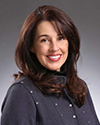 Amber Arellano, MPP is the founding executive director of The Education Trust-Midwest where she has overseen public policy, external relations and operations divisions of the organization since 2010, Today Ed Trust-Midwest is widely recognized as a leading voice for non-partisan data, research and policy expertise and under her leadership, has led a cross-sector development initiative of Michigan’s first statewide educator support and evaluation system. A veteran journalist, Arellano has earned national awards for her influential work on developing public engagement campaigns on behalf of Michigan’s vulnerable students. Arellano is a 2017-19 CEW+ Twink Frey Visiting Social Activist.
Amber Arellano, MPP is the founding executive director of The Education Trust-Midwest where she has overseen public policy, external relations and operations divisions of the organization since 2010, Today Ed Trust-Midwest is widely recognized as a leading voice for non-partisan data, research and policy expertise and under her leadership, has led a cross-sector development initiative of Michigan’s first statewide educator support and evaluation system. A veteran journalist, Arellano has earned national awards for her influential work on developing public engagement campaigns on behalf of Michigan’s vulnerable students. Arellano is a 2017-19 CEW+ Twink Frey Visiting Social Activist.
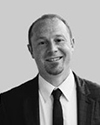 Steven Bodei, MA serves as the Associate Director of Student Life Leadership Education. M-LEAD is an integrative leadership education model that is purposeful, collaborative, values-based, and oriented toward social change. This approach for student life uses a collective impact framework to align and amplify the extensive leadership education efforts across Student Life and the broader institution. Prior to working in this role Steve worked in student leadership development in various roles within the office of Residence Education in University Housing at U-M.
Steven Bodei, MA serves as the Associate Director of Student Life Leadership Education. M-LEAD is an integrative leadership education model that is purposeful, collaborative, values-based, and oriented toward social change. This approach for student life uses a collective impact framework to align and amplify the extensive leadership education efforts across Student Life and the broader institution. Prior to working in this role Steve worked in student leadership development in various roles within the office of Residence Education in University Housing at U-M.
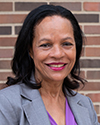 Jacqueline Bowman, PhD became the first Staff Ombudsperson at the University of Michigan in December 2018 after serving as the Lead Counselor and Program Specialist at the U-M Center for the Education of Women+ (CEW+). Dr. Bowman received her Doctorate of Philosophy in Educational Psychology degree from the University of Michigan. Since then she has served in multiple leadership roles, including as University Ombudsperson and Assistant Dean of Students at the University of Illinois at Urbana-Champaign. Dr. Bowman is committed to providing confidential assistance to staff, while advocating for fairness, supporting diversity, and providing services that promote an inclusive and equitable workplace environment.
Jacqueline Bowman, PhD became the first Staff Ombudsperson at the University of Michigan in December 2018 after serving as the Lead Counselor and Program Specialist at the U-M Center for the Education of Women+ (CEW+). Dr. Bowman received her Doctorate of Philosophy in Educational Psychology degree from the University of Michigan. Since then she has served in multiple leadership roles, including as University Ombudsperson and Assistant Dean of Students at the University of Illinois at Urbana-Champaign. Dr. Bowman is committed to providing confidential assistance to staff, while advocating for fairness, supporting diversity, and providing services that promote an inclusive and equitable workplace environment.
 Patricia Coleman-Burns, PhD, Assistant Professor Emerita of Nursing and Black Studies, has focused her career on retention and successful learning behaviors of underrepresented nursing students; health disparities and social justice in patient-centered care and providers’ behaviors; Black ideology; and the Colored Women’s Club Movement. A long-time advocate for the right of all persons to be free from gender oppression, sexism, racism, and violence, she currently serves on the board of Safehouse Center on domestic violence and sexual assault, and the U-M Women of Color in the Academy Project steering committee. Her research has evolved from rhetorical studies of radical and revolutionary social movements to a focus on racial identity in the reduction of health disparities through social justice and social determinants of health perspective that examines workforce diversity, the education of underrepresented persons, efficacious research and community impact.
Patricia Coleman-Burns, PhD, Assistant Professor Emerita of Nursing and Black Studies, has focused her career on retention and successful learning behaviors of underrepresented nursing students; health disparities and social justice in patient-centered care and providers’ behaviors; Black ideology; and the Colored Women’s Club Movement. A long-time advocate for the right of all persons to be free from gender oppression, sexism, racism, and violence, she currently serves on the board of Safehouse Center on domestic violence and sexual assault, and the U-M Women of Color in the Academy Project steering committee. Her research has evolved from rhetorical studies of radical and revolutionary social movements to a focus on racial identity in the reduction of health disparities through social justice and social determinants of health perspective that examines workforce diversity, the education of underrepresented persons, efficacious research and community impact.
Dessa Cosma, MA is the Founding Director of Detroit Disability Power a nonprofit organization that organizes people with disabilities around issues that impact their lives, while dismantling ableism in the institutions & social justice movements. She is committed to bridging the gap between disability inclusion work and other social justice efforts in order to build big, powerful movements that dismantle interlocking systems of oppression. Cosma is a long-time social justice organizer, fortunate to spend her career working for reproductive, racial, LGBTQ, economic and disability justice. Cosma is a 2017-19 CEW+ Twink Frey Visiting Social Activist.
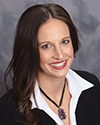 Andrea B. Darden, BBA, Darden Wealth Group, has been studying financial management for most of her life. At 12, she was providing stocks reports for her family. In college, she sold oil and gas contracts. After graduating from college, she was the securities coordinator nationally for Capital Resource Group out of Longwood, Florida. Andrea came back to Michigan for a position with Charles Schwab as a Vice President and Financial Consultant. At the age of 28, she left Charles Schwab to become an independent advisor. By the age of 32, she was a partner with Chisholm & Dames/Darden Investment Advisors. In 2018, Andrea founded her firm, Darden Wealth Group.
Andrea B. Darden, BBA, Darden Wealth Group, has been studying financial management for most of her life. At 12, she was providing stocks reports for her family. In college, she sold oil and gas contracts. After graduating from college, she was the securities coordinator nationally for Capital Resource Group out of Longwood, Florida. Andrea came back to Michigan for a position with Charles Schwab as a Vice President and Financial Consultant. At the age of 28, she left Charles Schwab to become an independent advisor. By the age of 32, she was a partner with Chisholm & Dames/Darden Investment Advisors. In 2018, Andrea founded her firm, Darden Wealth Group.
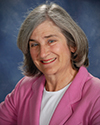 Sara Fitzgerald is retired after a career that included 15 years as an editor, author, and new media developer for The Washington Post and as a principal in a consulting firm created in 1997 to help schools and libraries take advantage of a new federal program to get them connected to the internet. She is the author of several well-known books and her biography, Elly Peterson: “Mother” of the Moderates, was recognized as a 2012 Michigan Book of the Year by the Library of Michigan and with a State History Award by the Historical Society of Michigan. Her next book, about the successful sex discrimination complaint that was filed against the University in 1970, is scheduled to be published in fall 2020 by the University of Michigan Press. She has worked on redistricting reform with both the League of Women Voters of the United States and the League of Women Voters of Virginia and currently serves on the board of directors of the media justice ministry of the United Church of Christ denomination.
Sara Fitzgerald is retired after a career that included 15 years as an editor, author, and new media developer for The Washington Post and as a principal in a consulting firm created in 1997 to help schools and libraries take advantage of a new federal program to get them connected to the internet. She is the author of several well-known books and her biography, Elly Peterson: “Mother” of the Moderates, was recognized as a 2012 Michigan Book of the Year by the Library of Michigan and with a State History Award by the Historical Society of Michigan. Her next book, about the successful sex discrimination complaint that was filed against the University in 1970, is scheduled to be published in fall 2020 by the University of Michigan Press. She has worked on redistricting reform with both the League of Women Voters of the United States and the League of Women Voters of Virginia and currently serves on the board of directors of the media justice ministry of the United Church of Christ denomination.
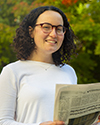 Maya Goldman is the 2019 editor in chief of The Michigan Daily. Maya joined the paper as a news reporter during the first week of her freshman year and went on to become a news editor and podcast producer before taking on The Daily’s top position last winter. Maya, now a senior, studies anthropology and writing at the University of Michigan. She currently spends most of her time on campus in the Stanford Lipsey Student Publications Building where she lives out her passion for telling stories and providing others with the platform and skills to do the same.
Maya Goldman is the 2019 editor in chief of The Michigan Daily. Maya joined the paper as a news reporter during the first week of her freshman year and went on to become a news editor and podcast producer before taking on The Daily’s top position last winter. Maya, now a senior, studies anthropology and writing at the University of Michigan. She currently spends most of her time on campus in the Stanford Lipsey Student Publications Building where she lives out her passion for telling stories and providing others with the platform and skills to do the same.
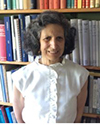 Michele Hannoosh, PhD is a full professor of French in the Department of Romance Languages & Literatures. Her areas of interest span a wide range of the literature, art, and culture of nineteenth-century France: poetry, the novel, and autobiography; art criticism, aesthetics, and the relations between the arts; the city, Walter Benjamin, and the history of modernity; the representation of history; parody, caricature and the comic; painting and early photography; Romanticism, Realism, and Decadence; the Mediterranean. Hannoosh also serves as one of the faculty ombuds.
Michele Hannoosh, PhD is a full professor of French in the Department of Romance Languages & Literatures. Her areas of interest span a wide range of the literature, art, and culture of nineteenth-century France: poetry, the novel, and autobiography; art criticism, aesthetics, and the relations between the arts; the city, Walter Benjamin, and the history of modernity; the representation of history; parody, caricature and the comic; painting and early photography; Romanticism, Realism, and Decadence; the Mediterranean. Hannoosh also serves as one of the faculty ombuds.
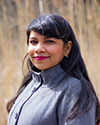 Fatema Haque, MA, has been designing curriculum, teaching and managing programs in higher education settings for nearly a decade. Previously, she was faculty and Dean of Students at the Asian University for Women, an international, liberal arts university in Chittagong, Bangladesh, dedicated to serving low-income students from all across Asia. At the University of Michigan, she has worked at the Ginsberg Center, Community-Engaged Academic Learning and the Medical School. Currently, she serves as the Academic Program Manager at the Barger Leadership Institute and prepares student leaders to peer-facilitate a project-based leadership course. She is passionate about facilitating learning that encourages self- and critical-reflection, learning that encourages students to understand their stories, privileges, values, and internalized scripts so that they can lead themselves and others effectively and equitably. As a queer, immigrant and first-generation college graduate who grew up in a single-parent, low-SES household, Fatema considers herself to be a nontraditional U-M graduate.
Fatema Haque, MA, has been designing curriculum, teaching and managing programs in higher education settings for nearly a decade. Previously, she was faculty and Dean of Students at the Asian University for Women, an international, liberal arts university in Chittagong, Bangladesh, dedicated to serving low-income students from all across Asia. At the University of Michigan, she has worked at the Ginsberg Center, Community-Engaged Academic Learning and the Medical School. Currently, she serves as the Academic Program Manager at the Barger Leadership Institute and prepares student leaders to peer-facilitate a project-based leadership course. She is passionate about facilitating learning that encourages self- and critical-reflection, learning that encourages students to understand their stories, privileges, values, and internalized scripts so that they can lead themselves and others effectively and equitably. As a queer, immigrant and first-generation college graduate who grew up in a single-parent, low-SES household, Fatema considers herself to be a nontraditional U-M graduate.
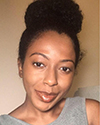 Mya Haynes is a University of Michigan alumna with a Bachelor of Arts degree in Sociology and is continuing her education at U-M to obtain her Master’s in Higher Education Public Policy. She holds strongly to her identities as a Black woman and first-generation college student and has previously conducted research focusing on both groups of students on campus. Throughout her undergraduate career, Mya has had the pleasure of working with several organizations including the Barger Leadership Institute (BLI), Comprehensive Studies Program (CSP), and the Office of Academic and Multicultural Initiatives (OAMI). As an undergraduate student, Mya became increasingly aware of the unique challenges that she and other underrepresented minority students faced throughout their college experiences. Mya is invested in promoting a higher ed community that seeks to address these challenges and support students throughout their college journeys. Mya currently works as the Coordinator of Diversity Initiatives for the Michigan Community Scholars Program (MCSP).
Mya Haynes is a University of Michigan alumna with a Bachelor of Arts degree in Sociology and is continuing her education at U-M to obtain her Master’s in Higher Education Public Policy. She holds strongly to her identities as a Black woman and first-generation college student and has previously conducted research focusing on both groups of students on campus. Throughout her undergraduate career, Mya has had the pleasure of working with several organizations including the Barger Leadership Institute (BLI), Comprehensive Studies Program (CSP), and the Office of Academic and Multicultural Initiatives (OAMI). As an undergraduate student, Mya became increasingly aware of the unique challenges that she and other underrepresented minority students faced throughout their college experiences. Mya is invested in promoting a higher ed community that seeks to address these challenges and support students throughout their college journeys. Mya currently works as the Coordinator of Diversity Initiatives for the Michigan Community Scholars Program (MCSP).
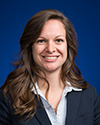 Colette Hemker is the University of Michigan Athletic Department Assistant Director of Leadership Development and Community Engagement. She works to develop altruistic and community-minded student-athletes who actively engage in solving problems and serving others through mutually beneficial community engagement initiatives. Before starting with the University full-time in October of 2018, Colette worked 8.5 years with the Ann Arbor YMCA as the Coordinator of Youth Sport and Outreach Programs then as the Director of Youth Community Programs where she assessed community needs and then designed, implemented, and evaluated year-round youth and family programming at 26 sites across Washtenaw County. She increased opportunity for 800+ individuals annually to become their best selves through increased physical activity, nutrition education and character development. She also identified and engaged over 40 like-minded community leaders to enhance program outcomes across the Ann Arbor Y service area through community partnerships and collaboration. Colette graduated from the University of Michigan with a Bachelor’s Degree in Sport Management in 2010. As a student, she was on the Women’s Novice Rowing Team and interned with both the Wrestling and Football teams.
Colette Hemker is the University of Michigan Athletic Department Assistant Director of Leadership Development and Community Engagement. She works to develop altruistic and community-minded student-athletes who actively engage in solving problems and serving others through mutually beneficial community engagement initiatives. Before starting with the University full-time in October of 2018, Colette worked 8.5 years with the Ann Arbor YMCA as the Coordinator of Youth Sport and Outreach Programs then as the Director of Youth Community Programs where she assessed community needs and then designed, implemented, and evaluated year-round youth and family programming at 26 sites across Washtenaw County. She increased opportunity for 800+ individuals annually to become their best selves through increased physical activity, nutrition education and character development. She also identified and engaged over 40 like-minded community leaders to enhance program outcomes across the Ann Arbor Y service area through community partnerships and collaboration. Colette graduated from the University of Michigan with a Bachelor’s Degree in Sport Management in 2010. As a student, she was on the Women’s Novice Rowing Team and interned with both the Wrestling and Football teams.
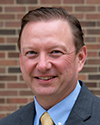 Rich Holcomb is the Associate Vice President for Human Resources at the University of Michigan and provides overall leadership to the human resources community, including the Ann Arbor, Flint, and Dearborn campuses and Michigan Medicine. Holcomb brings more than 25 years of experience in human resources to the position, most recently serving as Senior Director for Benefits, Health and Well-Being at U-M. His leadership strategies focus on people and relationships in the workplace, building partnerships, and supporting diverse cultures. He has held several leadership positions in University Human Resources and Michigan Medicine, including recently serving as interim Chief Human Resources Officer for Michigan Medicine. He previously worked at Foote Hospital in Jackson as Compensation and Benefits Manager. Holcomb earned a bachelor’s degree in employment relations and a master’s degree in labor relations and human resources, both from Michigan State University.
Rich Holcomb is the Associate Vice President for Human Resources at the University of Michigan and provides overall leadership to the human resources community, including the Ann Arbor, Flint, and Dearborn campuses and Michigan Medicine. Holcomb brings more than 25 years of experience in human resources to the position, most recently serving as Senior Director for Benefits, Health and Well-Being at U-M. His leadership strategies focus on people and relationships in the workplace, building partnerships, and supporting diverse cultures. He has held several leadership positions in University Human Resources and Michigan Medicine, including recently serving as interim Chief Human Resources Officer for Michigan Medicine. He previously worked at Foote Hospital in Jackson as Compensation and Benefits Manager. Holcomb earned a bachelor’s degree in employment relations and a master’s degree in labor relations and human resources, both from Michigan State University.
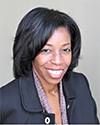 Dorine Lawrence-Hughes, JD, EdD currently serves as an Assistant Dean for Undergraduate Education at the University of Michigan’s College of Literature, Science and the Arts. In this role, she helps to facilitate curricular and co-curricular initiatives for effective teaching and learning. Her research focuses on communication and leadership and she is instrumental in supporting and developing women for leadership in higher education. Prior to her role at Michigan, Lawrence-Hughes was a Clinical Associate Professor and an administrator at the Annenberg School at the University of Southern California. Lawrence-Hughes earned a B.A. in politics from Whitman College, an M.A. from California State University, Northridge in communication, a J.D. from USC and an Ed.D. from UCLA.
Dorine Lawrence-Hughes, JD, EdD currently serves as an Assistant Dean for Undergraduate Education at the University of Michigan’s College of Literature, Science and the Arts. In this role, she helps to facilitate curricular and co-curricular initiatives for effective teaching and learning. Her research focuses on communication and leadership and she is instrumental in supporting and developing women for leadership in higher education. Prior to her role at Michigan, Lawrence-Hughes was a Clinical Associate Professor and an administrator at the Annenberg School at the University of Southern California. Lawrence-Hughes earned a B.A. in politics from Whitman College, an M.A. from California State University, Northridge in communication, a J.D. from USC and an Ed.D. from UCLA.
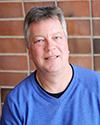 Thomas (Tom) Lehker, MA, is the University Student Ombudsperson. He has worked in higher education for almost 30 years, primarily at the University of Michigan providing leadership in the areas of student affairs, undergraduate career services, graduate student services, and ombuds work.
Thomas (Tom) Lehker, MA, is the University Student Ombudsperson. He has worked in higher education for almost 30 years, primarily at the University of Michigan providing leadership in the areas of student affairs, undergraduate career services, graduate student services, and ombuds work.
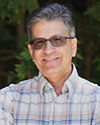 Robert Ortega, PhD, associate professor of social work, focuses his research on relationship development, group work practice, treatment interventions, and service utilization, particularly in the areas of mental health and child welfare. Dr. Ortega has published in the areas of social justice in group work practice, child welfare permanency planning, and culturally responsive practice. He is the recipient of multiple national awards including the 2013 Recent Distinguished Contributions to Social Work Education awarded by the Council on Social Work Education, and the 2015 Outstanding Service and Advancement of Cultural Competency in Child Maltreatment Prevention and Intervention Award, by the American Professional Society on the Abuse of Children.
Robert Ortega, PhD, associate professor of social work, focuses his research on relationship development, group work practice, treatment interventions, and service utilization, particularly in the areas of mental health and child welfare. Dr. Ortega has published in the areas of social justice in group work practice, child welfare permanency planning, and culturally responsive practice. He is the recipient of multiple national awards including the 2013 Recent Distinguished Contributions to Social Work Education awarded by the Council on Social Work Education, and the 2015 Outstanding Service and Advancement of Cultural Competency in Child Maltreatment Prevention and Intervention Award, by the American Professional Society on the Abuse of Children.
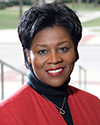 Darlene Ray‐Johnson, MA has worked in academic affairs and student affairs a total of 27 years. She currently serves as Graduate Student Affairs Officer and Resolution Officer at the U-M Rackham Graduate School, Dean’s Office at the University of Michigan. Her professional areas of expertise include social justice mediation, dispute resolution, conflict management and diversity, equity and inclusion issues. Her professional affiliations include membership in the Association of Conflict Resolution, Association on Higher Education and Disability (AHEAD), International Center for Academic Integrity and serving as past Directorate member on the Commission on Graduate and Professional Student Affairs and the Association of College Personnel Administrators (ACPA). She received her master’s degree from Western Michigan University in Counseling and College Student Personnel Administration.
Darlene Ray‐Johnson, MA has worked in academic affairs and student affairs a total of 27 years. She currently serves as Graduate Student Affairs Officer and Resolution Officer at the U-M Rackham Graduate School, Dean’s Office at the University of Michigan. Her professional areas of expertise include social justice mediation, dispute resolution, conflict management and diversity, equity and inclusion issues. Her professional affiliations include membership in the Association of Conflict Resolution, Association on Higher Education and Disability (AHEAD), International Center for Academic Integrity and serving as past Directorate member on the Commission on Graduate and Professional Student Affairs and the Association of College Personnel Administrators (ACPA). She received her master’s degree from Western Michigan University in Counseling and College Student Personnel Administration.
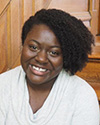 Danyelle Reynolds, MA is the assistant director for student learning and leadership at the U-M Edward Ginsberg Center. She manages leadership development opportunities for students and student organizations in order to advance their learning and organizational goals while meeting community-defined needs. Recently, she represented the Ginsberg Center on a team that collaborated to create a new massive online open course (MOOC) entitled Community Engagement: Collaborating for Change. In her work, research, and community involvement, Danyelle works to challenge traditional notions of who can be a leader and who can create sustainable change in their communities. She remains passionate about racial justice and, leadership development. Danyelle earned two BA degrees in History and Sociology from the University of Georgia and a MA degree in Higher Education & Student Affairs from The Ohio State University.
Danyelle Reynolds, MA is the assistant director for student learning and leadership at the U-M Edward Ginsberg Center. She manages leadership development opportunities for students and student organizations in order to advance their learning and organizational goals while meeting community-defined needs. Recently, she represented the Ginsberg Center on a team that collaborated to create a new massive online open course (MOOC) entitled Community Engagement: Collaborating for Change. In her work, research, and community involvement, Danyelle works to challenge traditional notions of who can be a leader and who can create sustainable change in their communities. She remains passionate about racial justice and, leadership development. Danyelle earned two BA degrees in History and Sociology from the University of Georgia and a MA degree in Higher Education & Student Affairs from The Ohio State University.
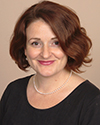 Mary Schlitt, MPA is the assistant director for the Barger Leadership Institute. As an LSA undergrad at the University of Michigan, Mary discovered both her capacity for leadership and love for the nonprofit sector during a sweltering internship managing logistics and volunteers at the Ann Arbor Summer Art Fair. With fire in her belly, she took on fundraising and marketing roles to advance the missions of the Girl Scout Council of Minneapolis and Smithsonian Institution Archives of American Art. As chief development officer at Food Gatherers, she created strategic partnerships to transition signature food drive events into fundraisers, secured the largest grant in the organization’s history and, as part of a funny and fierce leadership team, managed the day-to-day operations of this essential hunger-relief organization. Mary returned to the University of Michigan and the Barger Leadership Institute in 2017 to generate new partnerships and leadership learning opportunities for undergraduates. Mary is a mother to twin dragons and a budding presidential candidate, she holds a Master of Public Administration and a Bachelor of Arts in Psychology from the University of Michigan.
Mary Schlitt, MPA is the assistant director for the Barger Leadership Institute. As an LSA undergrad at the University of Michigan, Mary discovered both her capacity for leadership and love for the nonprofit sector during a sweltering internship managing logistics and volunteers at the Ann Arbor Summer Art Fair. With fire in her belly, she took on fundraising and marketing roles to advance the missions of the Girl Scout Council of Minneapolis and Smithsonian Institution Archives of American Art. As chief development officer at Food Gatherers, she created strategic partnerships to transition signature food drive events into fundraisers, secured the largest grant in the organization’s history and, as part of a funny and fierce leadership team, managed the day-to-day operations of this essential hunger-relief organization. Mary returned to the University of Michigan and the Barger Leadership Institute in 2017 to generate new partnerships and leadership learning opportunities for undergraduates. Mary is a mother to twin dragons and a budding presidential candidate, she holds a Master of Public Administration and a Bachelor of Arts in Psychology from the University of Michigan.
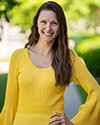 Nikki Sunstrum, MA is the Director of Social Media and Public Engagement at the U-M. As an internationally recognized public speaker and advocate of strategic online communications, Nikki is responsible for developing innovative solutions to leverage and advance interactive communications at one of the world’s top universities. Leading the University of Michigan’s social communications office (#UMSocial) and the strategic oversight of the President’s Public Engagement and Impact Initiative, her duties include the overarching coordination and leadership of a unified brand presence, standards and policy implementation, consultation, facilitation, and training. These efforts, along with the university Social Integrity project, each aim to ensure that all online communications provide additional value to university stakeholders, while mitigating institutional risk, elevating brand perception, and educating users of all ages, around the globe, of the lasting impact of these critical tools. Prior to assuming her current role, Sunstrum developed and coordinated the State of Michigan’s statewide social media footprint: reinventing constituent engagement, elevating transparency, and establishing Michigan as a trailblazer and leader for government social communications. Sunstrum possesses a Bachelor of Science degree from Grand Valley State University and a master’s degree from Aquinas College.
Nikki Sunstrum, MA is the Director of Social Media and Public Engagement at the U-M. As an internationally recognized public speaker and advocate of strategic online communications, Nikki is responsible for developing innovative solutions to leverage and advance interactive communications at one of the world’s top universities. Leading the University of Michigan’s social communications office (#UMSocial) and the strategic oversight of the President’s Public Engagement and Impact Initiative, her duties include the overarching coordination and leadership of a unified brand presence, standards and policy implementation, consultation, facilitation, and training. These efforts, along with the university Social Integrity project, each aim to ensure that all online communications provide additional value to university stakeholders, while mitigating institutional risk, elevating brand perception, and educating users of all ages, around the globe, of the lasting impact of these critical tools. Prior to assuming her current role, Sunstrum developed and coordinated the State of Michigan’s statewide social media footprint: reinventing constituent engagement, elevating transparency, and establishing Michigan as a trailblazer and leader for government social communications. Sunstrum possesses a Bachelor of Science degree from Grand Valley State University and a master’s degree from Aquinas College.
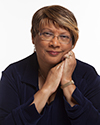 Laurita Thomas will become the President of the American Research Universities Human Resources Institute in November 2019 and will have responsibility for executive development of the CHROs of sixty-two major research universities in the United States and Canada. Thomas has retired from serving as the Associate Vice President for Human Resources at the University of Michigan where she was responsible for human resource policy for all U-M campuses and a full range of comprehensive integrated human resource services, products, and operations. She was responsible for 330 staff, a budget of $36M, and a benefits plan of approximately $1B. She is best known for her work to create environments where people thrive, partnerships prevail and performance excels. Her professional human resources career spans roles in the financial industry, higher education, and healthcare. She is a graduate of the University of Michigan in political science and economics. Her graduate work is in guidance and counseling and business administration. Thomas has published many articles and book chapters, including Inside the Minds, The Role of Human Resources, Aspatore Books.
Laurita Thomas will become the President of the American Research Universities Human Resources Institute in November 2019 and will have responsibility for executive development of the CHROs of sixty-two major research universities in the United States and Canada. Thomas has retired from serving as the Associate Vice President for Human Resources at the University of Michigan where she was responsible for human resource policy for all U-M campuses and a full range of comprehensive integrated human resource services, products, and operations. She was responsible for 330 staff, a budget of $36M, and a benefits plan of approximately $1B. She is best known for her work to create environments where people thrive, partnerships prevail and performance excels. Her professional human resources career spans roles in the financial industry, higher education, and healthcare. She is a graduate of the University of Michigan in political science and economics. Her graduate work is in guidance and counseling and business administration. Thomas has published many articles and book chapters, including Inside the Minds, The Role of Human Resources, Aspatore Books.
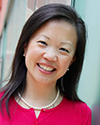 Marie Ting, PhD serves as the Associate Director for the U-M National Center for Institutional Diversity (NCID). She provides general oversight for the daily operations of the unit, including project compliance with University policies, budget development, and personnel management. Marie assists the Director in strategic planning and works to develop, nurture and maintain local and national programs. Dr. Ting assists in the development of an engaged learning environment for center professional and student staff, fostering an environment that is conducive to both professional and personal growth.
Marie Ting, PhD serves as the Associate Director for the U-M National Center for Institutional Diversity (NCID). She provides general oversight for the daily operations of the unit, including project compliance with University policies, budget development, and personnel management. Marie assists the Director in strategic planning and works to develop, nurture and maintain local and national programs. Dr. Ting assists in the development of an engaged learning environment for center professional and student staff, fostering an environment that is conducive to both professional and personal growth.
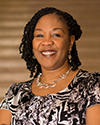 Deborah Willis, PhD is a Program Manager for Professional and Academic Development at the University of Michigan Rackham Graduate School and produces a wide array of innovative professional development programs to engage and enrich a highly diverse academic community. She developed and currently leads the Rackham Professional Development Diversity, Equity and Inclusion Certificate Program which aims to expand DEI competencies while fostering an inclusive environment. Throughout her career, Dr. Willis has been committed to providing leadership, vision, and advocacy for students, postdoctoral scholars, faculty, and staff, in the areas of professional development, career advancement, leadership and Diversity, Equity and Inclusion. She is a regular columnist for Inside Higher Ed’s graduate student professional advice column, “Carpe Careers.” Dr. Willis holds a PhD in Sociology from the University of Michigan.
Deborah Willis, PhD is a Program Manager for Professional and Academic Development at the University of Michigan Rackham Graduate School and produces a wide array of innovative professional development programs to engage and enrich a highly diverse academic community. She developed and currently leads the Rackham Professional Development Diversity, Equity and Inclusion Certificate Program which aims to expand DEI competencies while fostering an inclusive environment. Throughout her career, Dr. Willis has been committed to providing leadership, vision, and advocacy for students, postdoctoral scholars, faculty, and staff, in the areas of professional development, career advancement, leadership and Diversity, Equity and Inclusion. She is a regular columnist for Inside Higher Ed’s graduate student professional advice column, “Carpe Careers.” Dr. Willis holds a PhD in Sociology from the University of Michigan.
Morning Workshops
Session #1 – Finding Your Center: Staying Grounded While Navigating Decision Making and Leadership, Morgan Hull, LLMSW and Doreen Murasky, LMSW, ACSW
Every day, whether big or small, hard or easy, you make decisions; from the kind of breakfast you will eat to the leadership roles you undertake to your choice of career path. Decisions, although a part of life, can be stressful. This interactive workshop is created to dedicate a space for you to hit ‘pause’ and find your center. You will leave equipped with tools and resources to help build resilience and reduce stress by staying grounded while navigating the many decisions you face.
Session #2 – Advocating for Yourself: A Nontraditional Student’s Story of Perseverance, Stephanie Land, BA, and Poverty Solutions
This book talk highlights one woman’s struggle to escape an abusive relationship and elevate herself out of poverty in a socioeconomic system that seems to penalize the working poor instead of helping them. Stephanie Land cleaned houses and cared for her daughter while studying to attain her undergraduate degree in English from the University of Montana. Now a writing fellow at the Center for Community Change and the Economic Hardship Reporting Project, Land shares her courageous story of perseverance and transformation while navigating a broken system of government assistance, and how she has transitioned into an activist role to change the stigma surrounding people in poverty, especially single mothers.
Session #3 – Diverse Voices, Sex Discrimination, and the Role of Media in Advocacy: Sara Fitzgerald, 1972-73 Michigan Daily Editor, Maya Goldman, 2019 Michigan Daily Editor, and Nikki Sunstrum, MA, U-M Director of Social Media Communications & Public Engagement, Moderated by Dorine Lawrence-Hughes, JD, EdD, Assistant Dean for Undergraduate Education, U-M College of Literature, Science and the Arts
Join us for an exciting inter-generational conversation about women leaders in news and media. Sara Fitzgerald served as the first female editor of The Michigan Daily from 1972-73 (Class of 1973) while at the same time U-M women students and staff were organizing to address sexual discrimination on campus. Fitzgerald, in conversation with Maya Goldman, the current female Michigan Daily Editor-in-Chief, and Nikki Sunstrum, the Director of Social Media and Public Engagement at U-M, will discuss their career paths and recount how women have utilized Michigan media outlets to address inequities in higher education. This workshop will be an interactive discussion that will review critical thinking skills and practical strategies to evaluate news and media content.
Session #4 – Discovering Our Motivations to Advocate, Tiffany Marra, PhD and Sarah Prince, MA
In this workshop, individuals will be challenged to explore their values around advocacy work and how they define it in their own lives. Everyone will walk away with a personal definition of advocacy and a better understanding of the values that drive their advocacy work.
Afternoon Workshops
Session #5 – How Political Climate Can Drive Advocacy – Amber Arellano, MPP, and Dessa Cosma, MA; Moderated by Morgan Hull, LLMSW
The 2018 CEW+ Twink Frey Visiting Social Activists will discuss their current research projects and share how the turbulent political climate has impacted the focus of their advocacy work. Amber Arellano will discuss her efforts to bring proven best practices from leading education states to Michigan’s educational systems. The second half of this session will feature a presentation by Dessa Cosma on her findings regarding voting rights and accessibility at polling stations.
Session #6 – Redefining Leadership by Believing and Investing In the Possibility of YOU, Shannon Cohen, MPA
Shannon Cohen, author of Tough Skin, Soft Heart will offer a session that will empower today’s overextended leader to unpack and navigate the emotional, mental and physical strain that often accompanies a life committed to being a difference-maker. Join us for a discussion that will highlight the crucial connection between emotional intelligence and leadership and will offer individual and systems-level self-care strategies for collegiate professionals.
Session #7 – Role of the Ombuds in Promoting Self Advocacy (Panel) – Jacqueline Bowman, PhD; Michele Hannoosh, PhD; Thomas Lehker, MP; Robert Ortega, PhD; and Darlene Ray‐Johnson, MA
The University Ombuds assists individuals and/or groups within an organization to resolve conflicts focused primarily on the fair and equitable application of University policies, procedures, and practices. University Ombuds help visitors define their concern(s), understand them from different perspectives, and explore options to resolve or manage them. During this process, the Ombuds also helps to identify resources to help visitors navigate issues independently and develop important capacity-building skills. Come hear the University Ombuds discuss their role in supporting all members of the University community.
Session #8 – Nontraditional Forms of Leadership (Panel) – Panelists: Samer M. Ali, PhD; Patricia Coleman-Burns, PhD; Andrea Darden, BBA; Mya Haynes; and Marie Ting, PhD
Nontraditional leaders often arise as advocates and catalysts, leading grassroots efforts in response to issues and needs in overlooked communities and working outside the confines of formal structures. A community of practice leaders will discuss the common traits of nontraditional leadership styles and why the use of this practice is effective in campus and community advocacy work.
Session #9 Developing Leadership: Leadership Practitioners at Michigan (Panel) – Barger Leadership Institute – Panelists: Steven Bodei, MA, M-LEAD; Fatema Haque, MA, BLI; Colette Hemker, Michigan Athletics; Danyelle Reynolds, MA, Ginsberg Center; Deborah Willis, PhD, Rackham Graduate School. Moderator, Mary Schlitt, MPA BLI
How do you define leadership? Students at Michigan don’t have to search far to find leadership programming on campus. But who is leading these efforts? How are they creating access for non-traditional students and redefining leadership for all future leaders? The Michigan Leadership Collaborative (MLC) is a growing community, currently consisting of 13 colleges and co-curricular units dedicated to advancing leadership learning and removing institutional barriers for students who are intentionally trying to develop and progress as leaders. In this session, a panel of four leadership practitioners from the MLC will share their program highlights, successes, and challenges in working with undergraduate and graduate students and offer their respective approaches to leadership.
Moderator:
- Mary Schlitt, Assistant Director of the Barger Leadership Institute
Panelists:
- Colette Hemker, Assistant Director of Leadership Development and Community Engagement, Michigan Athletics
- Deborah Willis, Academic Program Manager for Professional and Academic Development, Rackham Graduate School
- Fatema Haque, Academic Program Manager, Barger Leadership Institute
- Steven Bodei, Associate Director, Leadership Education, Student Life MLead
- Danyelle Reynolds, Assistant Director, Student Learning and Leadership
Carol Hollenshead Inspire Awardees & Lightning Talks
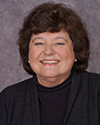 Marita R. Inglehart, Dipl. Psych., Dr. phil., Dr. phil. habil. is a Professor of Dentistry in the Department of Periodontics and Oral Medicine at the School of Dentistry and an Adjunct Professor of Psychology in the Department of Psychology in LSA at the University of Michigan. Her teaching of dental and dental hygiene students focuses on educating patient-centered and culturally sensitive future dental care providers who appreciate interprofessional collaborations. Her research focuses on the role of psycho-social factors in providing care and increasing access to care for underserved patient populations such as patients from socio-economically disadvantaged and/or racial/ethnic minority backgrounds, patients with special health care needs and/or from LGBTQ+ backgrounds.
Marita R. Inglehart, Dipl. Psych., Dr. phil., Dr. phil. habil. is a Professor of Dentistry in the Department of Periodontics and Oral Medicine at the School of Dentistry and an Adjunct Professor of Psychology in the Department of Psychology in LSA at the University of Michigan. Her teaching of dental and dental hygiene students focuses on educating patient-centered and culturally sensitive future dental care providers who appreciate interprofessional collaborations. Her research focuses on the role of psycho-social factors in providing care and increasing access to care for underserved patient populations such as patients from socio-economically disadvantaged and/or racial/ethnic minority backgrounds, patients with special health care needs and/or from LGBTQ+ backgrounds.
Lightning Talk Title:
Being a Solo Person in an Organization – How to Survive and Create Change
Since coming to the dental school in February of 1990, I learned a lot and had eye-opening experiences as an immigrant and the only faculty member trained as a psychologist. My question since that time has been: How can a solo person in an organization survive when the going is tough? I came to the conclusion that three psychological strategies and three professional considerations are crucial. The three psychological strategies are based on Serge Moscovici’s research. This French social psychologist tells us that if minorities are persistent, consistent and have positive self-esteem, they can change the world. The three professional considerations are that leadership support is crucial, that building effective coalitions is a “must”, and that finding meaning in one’s work is imperative. Since the 1990s, the dental school has continuously implemented a combination of these strategies and considerations that have resulted in positive changes.
Workshop Date & Time:
Thursday, November 14, 2-4:00pm
(workshop 2-3:30, followed by a networking reception until 4:00)
Workshop Title:
Being a Solo Person in an Organization – Coalition Building for Creating Change
There are several psychological and professional considerations that solo persons can use to survive in organizations and create change. The objectives of this workshop are (a) to focus on one professional consideration, namely, coalition building across social identity lines, and (b) to reflect on how three psychological considerations based on the social psychologist Serge Moscovici’s work can be utilized to create change. Part 1 will be to create a better understanding of the differences, but also the similarities we have with others and how our own social identity and cultural background could potentially limit us in building successful coalitions. Part 2 will introduce Moscovici’s work concerning how solo persons need to be persistent and consistent and have the self-confidence to bring about change. Participants will have an opportunity to discuss how these principles can be applied to their own situation and share strategies that might result in increasing diversity, equity, and inclusion in their own organizational environment.
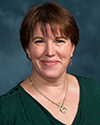 Michelle A. Meade, PhD is an Associate Professor in the U-M Department of Physical Medicine and Rehabilitation. As a rehabilitation psychologist, she conducts research with, provides clinical services to, and advocates for individuals with physical disabilities. Dr. Meade is currently the Principal Investigator and Director of two federally funded interdisciplinary Centers focusing on disability issues – the U-M Rehabilitation Engineering Research Center (RERC) and Technology Increasing Knowledge: Technology Optimizing Choice (TIKTOC) which is focused on developing and evaluating mobile technologies to enhance health management and independence among adolescents and young adults with disabilities; and the Rehabilitation Research and Training Center on Investigating Disability factors and promoting Environmental Access for Healthy Living (IDEAL RRTC), which is focused on promoting healthy aging for individuals with long-term physical disabilities. Dr. Meade also serves as co-chair of the Michigan Medicine Disability Council and the Co-director for the U -M Collaboratory for Disability Health.
Michelle A. Meade, PhD is an Associate Professor in the U-M Department of Physical Medicine and Rehabilitation. As a rehabilitation psychologist, she conducts research with, provides clinical services to, and advocates for individuals with physical disabilities. Dr. Meade is currently the Principal Investigator and Director of two federally funded interdisciplinary Centers focusing on disability issues – the U-M Rehabilitation Engineering Research Center (RERC) and Technology Increasing Knowledge: Technology Optimizing Choice (TIKTOC) which is focused on developing and evaluating mobile technologies to enhance health management and independence among adolescents and young adults with disabilities; and the Rehabilitation Research and Training Center on Investigating Disability factors and promoting Environmental Access for Healthy Living (IDEAL RRTC), which is focused on promoting healthy aging for individuals with long-term physical disabilities. Dr. Meade also serves as co-chair of the Michigan Medicine Disability Council and the Co-director for the U -M Collaboratory for Disability Health.
Lightning Talk Title:
Healthcare Disparities Among Individuals with Disabilities – Taking Responsibility for Our Role as Healthcare Providers
Over 65 million Americans – or 1 in 4 individuals – have a disability. These individuals experience poorer access to care, lesser quality of care and worse outcomes from care than individuals without disabilities. While there are many factors at both the individual and environment level which contribute to health disparities, the healthcare disparities fall squarely on our shoulders as healthcare providers – and healthcare systems. We need to tailor how we provide care to meet the unique needs, strengths, challenges, and abilities of the individuals with whom we interact and to whom we provide treatment.
Workshop Date & Time:
TBD
Workshop Title:
Trying to Make a Difference – An Iterative Approach
This workshop will discuss Meade’s journey in finding her calling – working to promote change within healthcare systems to address healthcare disparities experienced by individuals with disabilities. Participants will learn about (or review) critical skills – including visioning and problem solving – and be encouraged to identify their own strengths, passions, and skills while working to develop a vision of the change they want to make in the world. This workshop and the associated discussion of her journey identify the importance of admitting and learning from mistakes, refocusing on what is important and recognizing the overlap between professional interests and personal circumstances. In particular, Meade will share how her research allowed her to better understand and support friends and family members with impairments and how their concerns have driven her to work to enhance how we – as a system – provide care and promote health.
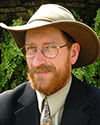 Dr. David C. Michener is the curator at the U-M Matthaei Botanical Gardens and Nichols Arboretum. Best known to the public for his co-authored book Peony, which made the New York Times 2018 Summer Reading List, his research addresses understanding the complex cross-cultural heritages of ornamental peonies and conserving key living specimens. He has an active program in molecular-evidence of peony relationships with colleagues and students here at U-M and in Belarus. His work with Indigenous Seeds in museum collections is an unanticipated intersection of deep engagement with U-M’s Museum Studies Program (Rackham Graduate School) and an ethical concern with the ‘Voice’ of Indigenous Communities in interpreting native plant collections and landscapes stewarded by the Botanical Gardens & Arboretum. Before coming to Michigan, David earned his BA in Botany (UNC-Chapel Hill), and his PhD (Claremont Graduate School) was followed by a NSF-funded postdoc at Harvard’s Arnold Arboretum.
Dr. David C. Michener is the curator at the U-M Matthaei Botanical Gardens and Nichols Arboretum. Best known to the public for his co-authored book Peony, which made the New York Times 2018 Summer Reading List, his research addresses understanding the complex cross-cultural heritages of ornamental peonies and conserving key living specimens. He has an active program in molecular-evidence of peony relationships with colleagues and students here at U-M and in Belarus. His work with Indigenous Seeds in museum collections is an unanticipated intersection of deep engagement with U-M’s Museum Studies Program (Rackham Graduate School) and an ethical concern with the ‘Voice’ of Indigenous Communities in interpreting native plant collections and landscapes stewarded by the Botanical Gardens & Arboretum. Before coming to Michigan, David earned his BA in Botany (UNC-Chapel Hill), and his PhD (Claremont Graduate School) was followed by a NSF-funded postdoc at Harvard’s Arnold Arboretum.
Lightning Talk Title:
Seeds and Reconciliation
Major science museums, including U-M, have extensive collections of culturally important food and ceremonial plant seeds collected from Indigenous People. These reference seeds were never intended to leave a museum’s deep stewardship. Yet each is part of its nation’s cultural heritage, with little doubt that some seeds are still alive—literally vital community members in a dead-storage dispersion (diaspora). Growing out selected seeds and rematriating them, and reuniting their affiliated information with their Communities of Origin is profound and consequential work. The seeds’ return can strengthen each Nation’s sovereign conception of its sustainable lifeways. Ethical, spiritual, legal, and academic values of the engaged parties are nuanced, varyingly privileged, and at times conflicted from each perspective. This is especially true for the Great Lakes Anishinaabek Nations, where the culture is matriarchal and the seeds serve prophetic purposes. This is a landmark national approach in reconciliation, with international impact.
Workshop Date & Time:
February 2020 (TBD)
Workshop Title:
Who Speaks for Seeds? Respectful Listening – Meaningful Actions
The concept of Rematriation as Reconciliation is simple. It is the return of living seeds to their Community of Origin. But issues of trust soon emerge. Who is involved in conceptually framing and prioritizing critical thought and action? Who/what Community Members have both standing and agency to be engaged—ethically, spiritually, and legally? Who speaks for Indigenous Nation’s seeds in museum diaspora? What is “listening” when contributing parties’ paradigms of reality are not fully congruent?
This workshop, co-led by a Tribal Partner, will address deep listening skills as a key to trust-building. The Heritage Seeds Project and how it grew into the Indigenous Collaborative Garden will be one trust-building example. The challenges of deep listening from an academic perspective are real. Participants should become aware that Reconciliation is about fundamental change – in one’s self.
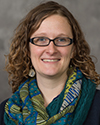 Natalie Sampson, PhD, MPH is an Assistant Professor of Public Health at UM-Dearborn, where she teaches courses in environmental health, community organizing, and health promotion. Grounded primarily in Southeast Michigan, she studies transportation and land use planning, stormwater infrastructure, vacant land reuse, and climate change planning efforts, particularly their implications for health. She applies participatory research approaches with diverse partners using a broad methodological toolkit, including photovoice, concept mapping, and health impact assessment. In 2017, Dr. Sampson received the American Public Health Association’s Rebecca Head Award, which recognizes “an outstanding emerging leader from the environmental field working at the nexus of science, policy, and environmental justice.” Dr. Sampson holds a Bachelor of Science from U of M’s School of Natural Resources and the Environment (now U-M SEAS), an MPH from the Portland State University, and a PhD from U-M’s School of Public Health.
Natalie Sampson, PhD, MPH is an Assistant Professor of Public Health at UM-Dearborn, where she teaches courses in environmental health, community organizing, and health promotion. Grounded primarily in Southeast Michigan, she studies transportation and land use planning, stormwater infrastructure, vacant land reuse, and climate change planning efforts, particularly their implications for health. She applies participatory research approaches with diverse partners using a broad methodological toolkit, including photovoice, concept mapping, and health impact assessment. In 2017, Dr. Sampson received the American Public Health Association’s Rebecca Head Award, which recognizes “an outstanding emerging leader from the environmental field working at the nexus of science, policy, and environmental justice.” Dr. Sampson holds a Bachelor of Science from U of M’s School of Natural Resources and the Environment (now U-M SEAS), an MPH from the Portland State University, and a PhD from U-M’s School of Public Health.
Lightning Talk Title:
Sometimes at Odds: Rethinking Output as an Equity-Focused Academic
Scholarly research is necessary but not sufficient for developing evidence-based programs or policies that reduce environmental health inequities. Change in Lansing or D.C. rarely comes without the uprising of everyday people launching campaigns to educate decision-makers on environmental threats, demanding research studies to document impact and assess risk, or participating in decision-making and direct action. Frontline communities lift up issues and solutions, even when it is risky, tiresome, and traumatic. Meanwhile, in academia, we often play in safer spaces with credit for outputs that may or may not immediately benefit those communities that are often the subject of our research. I discuss examples and associated challenges of creating accessible materials, including reports, blogs, op-eds, policy statements, public comments, fact sheets, or digital media. In this talk, I argue that environmental health researchers must disseminate findings beyond conventional forums to support meaningful policy dialogue during these urgent times of environmental crisis.
Workshop Date & Time:
May 7, Thursday 2-4:00pm
(workshop 2:00-3:30pm, followed by a networking reception)
Workshop Title:
Confronting our Climate Grief
In 2017, the American Psychological Association, Climate for Health, and ecoAmerica published, “Mental Health and our Changing Climate: Impacts, Implications, and Guidance.” In October 2018, the U.N. released a report warning that without “unprecedented” political actions, we will likely see catastrophic conditions by 2040. Globally, most communities are already experiencing effects of climate change, and the poorest members of society remain most vulnerable. In this uncertain context, climate grief is real, particularly as the crisis is largely beyond any individual’s ability to control. As a scholar studying climate change, Sampson has sought emerging evidence-based strategies in hopes of coping and building resiliency. In this workshop, together we will: 1) confront our sometimes silent, biggest fears related to climate change, 2) identify ways our community or current professional work may be climate-affected, and 3) create a personal climate resiliency plan that may include household or community action or policy advocacy strategies.
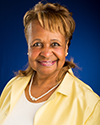 Wendy Ann Woods served the citizens of Ann Arbor from 2001 to 2007 as City Councilwoman. She is a strong advocate for affordable housing, a vibrant downtown, a balanced budget, a living wage ordinance, and corporate social responsibility. She earned a Bachelor of Science degree in Forestry Management and a Master of Science degree in Environmental Policy and Management at the School of Natural Resources and Environment at the University of Michigan. Woods is the Associate Director of the Michigan Community Scholars Program (MCSP), a nationally recognized living-learning program at the U-M that focuses on social justice, community service, diversity, and civic engagement. She also teaches a seminar for the students in MCSP, is a member of the Association of Black Professionals, Faculty, Administrators, and Staff at U-M; and serves on the Advisory Board for the University Outreach Council.
Wendy Ann Woods served the citizens of Ann Arbor from 2001 to 2007 as City Councilwoman. She is a strong advocate for affordable housing, a vibrant downtown, a balanced budget, a living wage ordinance, and corporate social responsibility. She earned a Bachelor of Science degree in Forestry Management and a Master of Science degree in Environmental Policy and Management at the School of Natural Resources and Environment at the University of Michigan. Woods is the Associate Director of the Michigan Community Scholars Program (MCSP), a nationally recognized living-learning program at the U-M that focuses on social justice, community service, diversity, and civic engagement. She also teaches a seminar for the students in MCSP, is a member of the Association of Black Professionals, Faculty, Administrators, and Staff at U-M; and serves on the Advisory Board for the University Outreach Council.
Lightning Talk Title:
Boldness Rules the World: Sustaining Leadership
My grandmother always told me that “boldness rules the world.” By that, she was encouraging me to speak up, ask questions, be polite yet persistent, and never, ever feel like I was not good enough. She also lived by the creed that a ship in the harbor is safe, but that’s not what ships were built for. I have taken those approaches to living and I bring them with me when I enter – in my teaching, advising, working with students, and engaging our community both on campus and in the town. At some times, I have been one of very few women of color in my surroundings and rather than be shy or fade into the wallpaper, I have chosen to step forward boldly and use my experiences to add to the conversations and the new opportunities for engagement. In my lightning talk, I will discuss creative approaches I have used over the past twenty-five years to be bold and confidently steer the ship.
Workshop Date & Time:
March 20, Friday 2-4:00pm
(workshop 2:00-3:30pm, followed by a networking reception)
Workshop Title:
Launching Your Ship
In this workshop, Woods will share experiences in creatively tackling problems and experiencing the joys of coalition building. Participants will be encouraged to think about how they approach situations where the ship they are in seems to be stuck in a port and is not going anyplace. Stuck in racism? Stuck in sexism? Stuck in certain social classes? What do you need to make your ship sail? Will a new captain do it? Or, should you be the “Captain of your own fate?” Do you need a new destination? Are you bored with the direction you have been going? Are you going in circles? Do you need new perspectives, new shipmates? Have you outgrown the mundane, xenophobic habits of those in your circle? How can you develop healthy habits to move your life and community forward? Short, interactive activities will assist each participant in using the ship metaphor to move forward in their life.
Directions
& Parking
Parking is available on Central Campus at the Palmer Commons structure located east of the League, off Washtenaw Avenue & Palmer Drive. Parkers should pull a parking ticket upon entering the structure and pay the cashier upon exiting. The parking rate at the Palmer structure is $0.75 per half-hour. Click here for directions to the Palmer Commons parking structure, along with maps.
Blue & Gold AVI Parking is also available in the Fletcher Street parking structure (next to the Power Center and University Health Services) and in the Thayer Street structure across from the Modern Languages Building (MLB). Please arrive early because these parking structures will fill up quickly.
State Street Commuter Lot: Conference participants are also encouraged to use the free State Street Commuter Lot (bottom of map highlighted in purple) and take the AATA 36 bus which will bring you directly to Hill Auditorium and the Michigan League. Please allow an extra 15-20 minutes for travel time. The AATA buses are free to U-M personnel with an active MCard.
Co-sponsors
This Symposium is made possible through the generous support of CEW+’s Frances & Sydney Lewis Visiting Leaders Fund and the CEW+ Mullin Welch Fund. CEW+ would also like to thank the following supporters of this event:
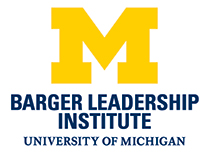 Barger Leadership Institute (BLI) is a student-powered, faculty-guided community dedicated to developing leadership learning through engaged liberal arts education. Students face complex, global problems which require collaborations that span competing interests, sectors, and nations. BLI helps prepare future leaders to face these 21st-century demands by uniting world-class scholarship, passionate undergraduates, and dedicated alumni in diverse experiences that reach beyond the conventional classroom.
Barger Leadership Institute (BLI) is a student-powered, faculty-guided community dedicated to developing leadership learning through engaged liberal arts education. Students face complex, global problems which require collaborations that span competing interests, sectors, and nations. BLI helps prepare future leaders to face these 21st-century demands by uniting world-class scholarship, passionate undergraduates, and dedicated alumni in diverse experiences that reach beyond the conventional classroom.
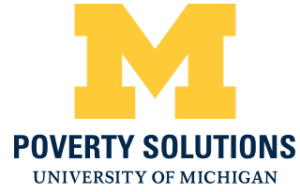 Poverty Solutions at the University of Michigan is a multidisciplinary initiative to inform, seek out, and test new models and strategies for preventing and alleviating poverty. Poverty Solutions includes faculty and staff from various schools and colleges and builds upon strong community partnerships to provide new engaged learning opportunities for U-M students.
Poverty Solutions at the University of Michigan is a multidisciplinary initiative to inform, seek out, and test new models and strategies for preventing and alleviating poverty. Poverty Solutions includes faculty and staff from various schools and colleges and builds upon strong community partnerships to provide new engaged learning opportunities for U-M students.


